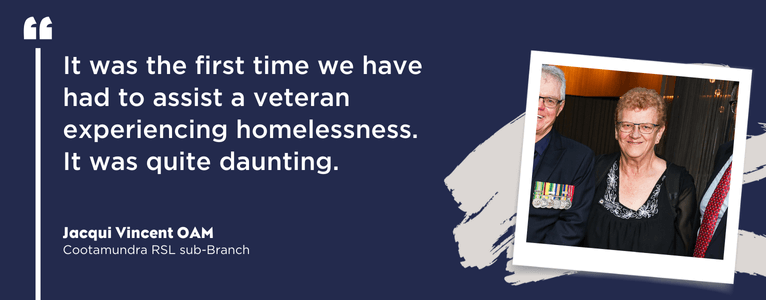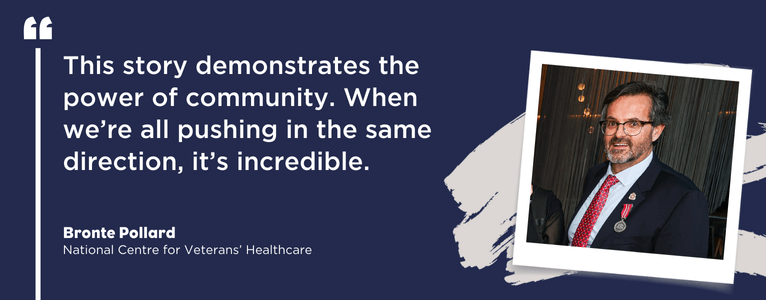All for one: How RSL sub-Branches banded together to help a veteran in need

These regional RSL sub-Branches cooperated with vital health services to provide wellbeing, transport and accommodation support to a veteran doing it tough.
By Girard Dorney
The following helplines are designed specifically for veterans and the family members of veterans:
- Open Arms 24-hour Support Line (1800 011 046)
- Australian Defence Force (ADF) All Hours Support Line (1800 628 036)
- Defence Family Helpline (1800 624 608)
Other general helplines include:
- Lifeline 24/7 Crisis Support (13 11 14)
- Suicide Call Back Service (1300 659 467)
Riley, a veteran, was lying under a bridge in the town of Young. He was in the middle of an acute mental health crisis exacerbated by discomfort in his amputated leg and pain from his neck, back and shoulder injuries.
A lot of the pain was from injuries sustained years ago, the same injuries that resulted in his medical discharge from Defence after nearly 10 years of service. Thanks to treatment he had achieved stability over the years, but his life had spiralled and his medication was gone.
It was at this moment that the series of unfortunate happenings that had left Riley experiencing homelessness for three nights was finally interrupted by a stroke of luck. One of the town’s police officers who saw him at the station was a veteran. She heard Riley speak about his service.

The officer contacted the Boorowa RSL sub-Branch, about a thirty-minute drive away. Could they help? They provided initial assistance with three nights’ accommodation in a motel, but later called the Cootamundra RSL sub-Branch, which had a dedicated drop-in centre.
Jacqui Vincent OAM, Secretary, Treasurer of the Cootamundra RSL sub-Branch, answered the phone.
A support network grows
“It was the first time we have had to assist a veteran experiencing homelessness,” says Vincent. “It was quite daunting.”
After a 90-minute drive, Riley arrived. Vincent and Cootamundra sub-Branch President Danny Whitehead were volunteering at the drop-in centre. Times like this were why they trained to be RSL NSW Wellbeing Support Officers (WSOs).
Riley had lost much of his documentation, but a search by Cootamundra’s accredited advocate, Gerry O’Brien, revealed Riley was a gold card holder. Another week in a motel was paid for, but, looking for something more permanent, Vincent reached out to Bronte Pollard, RSL NSW Liaison Officer at the National Centre for Veterans’ Healthcare (NCVH), who had facilitated her WSO training.
“We realised his situation was too acute even for our specialist services,” explains Pollard. “Our clinical operations manager and a consulting psychiatrist gave advice. Riley needed an in-patient admission to a local health care facility to stabilise his medication.”
Here are five mental health tips for veterans and their families.
Riley would stay the next six weeks at the mental health unit at Wagga Wagga.
“I visited Riley about once a week and took him on some escorted outings from the facility to the bank and the like, so he could begin to get on top of his affairs,” says Vincent.
Once stabilised, he needed a home. Unfortunately, the cost-of-living crisis made that a battle.
“They would not let him out of that facility until he had a permanent address,” says Vincent. “I was not giving up until I had him moved into accommodation.”
Riley himself found an ad for a small place in Tumut, about an hour from Cootamundra. Vincent handled the application process for him, helped by a social worker at Wagga Wagga Base Hospital.
Then, another stroke of luck: the bedsit turned out to be owned by the Tumut RSL sub-Branch.
The road to recovery
In his role as liaison officer, Pollard got the Tumut RSL sub-Branch on the same page as the rest of Riley’s support team.
“When it’s known someone has been at an in-patient facility, some people may have concerns about that person’s behaviour,” Pollard tells Reveille.
“My approach is to normalise the condition. Riley is on medication and a good, functioning person. I have osteoarthritis and I take medication. Bad outcomes might happen if we weren’t on medication, but you don’t shun people with a condition like mine.”
Once Riley was in his own place, the NCVH began figuring out whether he needed a new prosthesis for his leg and assisting with his other musculoskeletal issues.

Boorowa RSL sub-Branch kept up its support, with Alan Banks having Riley’s vehicle serviced and re-registered.
Getting Riley to his car was another challenge. A member from yet another sub-Branch put his hand up. Keith Wood, from the Gundagai RSL sub-Branch, travelled 30 minutes south to Tumut to pick Riley up, then an hour and a half back north to Young.
Vincent describes the teamwork between all the organisations as “phenomenal”.
“When these sorts of things happen, you need to collaborate.” she explains.
Cootamundra RSL sub-Branch, and Vincent, may have done a large share of the work, but members from the sub-Branches in Tumut, Young, Boorowa and Gundagai played their part. And that’s before you mention the Young police, the staff at the Wagga Wagga hospital, and the staff at NCVH.
The power of community
Both Vincent and Pollard say that collaboration is crucial.
“You have to know you’re not alone, when to reach out and where your boundaries are,” says Pollard. “Too many times well-meaning people get to that point where they’ve done amazing work, but they push past their capacity. There’s no need to do that.”
There’s another lesson in this story, something is transformative for RSL NSW in the best possible way: sub-Branches came together.
It didn’t matter that they were from different districts, hours from one another, or had disparities in their membership make-up and resources; they answered the call and contributed what they could. A single sub-Branch wouldn’t have been able to complete this mission.
The people involved shared a few things – they had served their countries and are now serving their communities. Today, they have another thing in common. Because of them, a veteran who hit rock bottom has a home.
“This story demonstrates the power of community,” says Pollard. “When we’re all pushing in the same direction, it’s incredible.”
RSL NSW is committed to providing essential support and services to veterans and their families. Contact your local RSL sub-Branch to access support, services, mateship and camaraderie.







